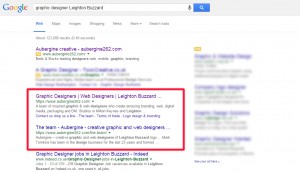Good business website basics 2 of 3: Getting on with Google.
OK, let’s face it – there is only one search engine, and that’s Google. The term, much like the way vacuum cleaners became known by their original market leader’s name of Hoover, to ‘Google it’ is now the term used to search for something online.
With that in mind, here’s a basic (but nonetheless important) guide for website owners (or those responsible for one) in getting your business’s website prioritised on Google.
It must be first prefaced with the fact that there are two ways.
A. Natural search results – the website pages that Google has visited and displays to you in the main area of a Google search page, like this:

B. Paid-for advertising, also known as pay-per-click using Google Adwords. Your website would appear here:

Bear in mind that Google is getting ever-more commercial – whereas “natural” search positions used to take up the majority of screen space, nowadays it’s the paid-for sections that prevail. So whilst “search engine optimisation” – the art of getting clicks to your site without paying for them – is still important, bear in mind that Google is pushing all website owners to consider paid-for adverts more and more.
1. A good foundation.
The first thing to remember is that just because you have a website, does not mean that you will instantly be found on Google. Google has around 30 trillion web pages it needs to visit and remember around the world, or ‘cache’ as we call it. Only once it’s done and has entered the website’s page addresses into its index, will it know where to send a person searching for a particular thing that relates directly to the phrase that connects with your business.
So, how do I do that?
Here’s an example: Let’s say you own a florist in Leighton Buzzard, you need to make sure that your website has your Leighton Buzzard address on it and that the site’s page titles and content refer to you being a florist and doing things with flowers. This is a very simple way of putting it, but you get the idea. In essence, telling Google who you are, what you do (by the site’s page titles) and where in the world you are.
You also need to make sure that you have a business listing on Google My Business. As a business, you can ‘claim’ your place on Google map results for your business address. If you’re not already listed, go to www.google.co.uk/business and search for your business – you’ll need a Google account to claim the place if it’s unclaimed.
Google then knows who you are and, more almost as importantly, where you are.
Next up is a harder part…
2. Content or ‘on-page optimisation’.
Content on the site and the pages’ title are important. SEO experts call this ‘on-page optimisation’. Google’s little spiders (the bits of code that skim across the world’s websites and report back to Google’s index on what they’ve found) will read through the website’s page titles and the content of the site, the titles of images and videos you have and try to get an idea of what the page is about – yes, it can figure it out. So, it’s important to make sure that you use plain, simple English (if your website is aimed at the English market that is) and the images and page content you use all have alternative text as to what they are.
If we go back to our florist example, the page called ‘bouquets’ will have well-written text on it explaining to the potential customer about how the bouquets are made and how the customer can order them. There may be a handful of pictures on this page too. These all need to be labelled and called something that is relevant to the page. The number of times we see websites where the owner has simply either uploaded an image from a stock library and is called ‘iStockphoto1637463.jpg’ or directly from a camera and is called ‘DSC01923.jpg’. Call the images what they are before you upload them, e.g. ‘pink-rose-bouquet.jpg’. Content is important and still one of the key parts of best practice website ownership.
Next up…
3.Links.
Google’s algorithm is complex and changing – but one thing that hasn’t changed, is how important links from other websites to yours are. It’s one of the hardest parts of being a website owner but worth every ounce of effort.
Years ago, when the internet was in short trousers, when Google’s competitors (Yahoo, Alta Vista, Lycos etc) were still important, website owners could trick the search engines by plastering hundreds and hundreds of keywords all over the website, making the text completely unintelligible but making search engines ‘think’ this website was the centre of the universe for that particular search phrase.
This, as you might imagine, become completely abused and Google changed the landscape by simply saying ‘I don’t trust website owners to be honest’ and moved high value on those websites that had links TO that website from all over the internet. Their logic being “if someone cares enough to put a link on their site to yours, and send their own visitors to you, you must be doing something right”.
Initially, a loophole was found by people ‘buying’ links from shady outfits, usually based in Bangalore, claiming to be able to ‘get you on the first page of Google’ and would simply make lots of low value links to your website (while you continued to pay them) from valueless and junk directories they set up just for that purpose. Thankfully, Google cottoned on to this and the algorithm can now work out whether you’ve basically cheated and bought-in links or done the decent thing.
So, what is the decent thing? It’s hard and there’s no denying it. But Google really wants website owners to have links to their site from happy customers, suppliers, peers, bona fide review companies and content-appropriate blogs and news sites. That way, Google will be able to see that you have not cheated because putting a link TO your site means that the person linking to you has valid reason.
Nobody is saying this will be easy, it isn’t, but those that embark on it will be rewarded.
The net result is that it will increase your Domain Authority (Google’s scoring of your site against its benchmarks and other websites). By getting just 10 inbound links in a 3-6 months period will see this authority increase hugely and in Google’s eyes, that’s a good thing. And the more you get, the better your domain authority will be.
Brace yourself…
4. Social media.
Jeez, if we’ve heard it once, we’ve heard enough already – ‘Facebook’ this ‘Twitter’ that. There’s no denying that there’s a place for it. It’s a great channel (or medium) for businesses to interact with their customers and to get messages across in a wide and free way. The more you use these social channels, the more you engage with your customers and that will obviously increase your brand awareness = resulting in more enquiries. However, its contribution to Google search results is negligible – less than 10% of your whole internet-based sphere of influence will come from social media. It’s easy to fake – and the rule of thumb with Google is, if it’s easy to fake, they don’t take it into account.
So, should you have a Facebook and/or Twitter page? Yes, it certainly won’t hurt but be mindful – just make sure you update it regular (perhaps not as regularly as you post on Facebook about how much wine you plan to consume at the weekend) but keep it fresh – at least once a month – the more the better. For Twitter this is different – it’s about interacting with your audience, rather than shouting at them. If you don’t have the time or inclination to interact with your potential customers, maybe it’s not for you.
Next month we will be publishing our ‘Basics to Social Media: Should I bother for my business and how do I do it?
...and FINALLY!
5. Google Adwords, aka Pay-per-Click.
Some years ago, you could say ‘per-per-click’ to a business website owner and feel the air become frigid in seconds – the fear was palpable.
In the early days it had a reputation of being somewhere that you could rinse thousands of pounds at the hands of those competitors who chose to click-click-click-click on your adverts and before you knew it, your credit card was maxed-out.Those times are over. Well and truly.
Google Adwords are an established and incredibly effective way to directly target your products or services to the people actually searching for those things – and at an affordable and clear ROI (return on investment).
With just a small budget – as little as £50 in some cases – you can compete online and see a direct translation into increased sales and new enquiries.
Not for the first time, we have had customers new to Google Adwords call us up and ask us to pause on the adverts. Not because they don’t see its benefit but because it has increased the sales or enquiries to a point they just can’t cope and don’t want to let their potential customers down.
It’s fully controllable – you can set how much you want to spend, over how long, when the adverts show – it’s all set by you to best suit your business.
Google has seen that it can no longer leave the natural selection in the hands of any old website owner and sees its future from its advertisers – and so rewards accordingly.
“I’m not a web person, how do I do all this?”
You can. You can do all this yourself – the knowledge and the tools are out there and are all for free from Google for you if you make the time to learn.
However, if you find the prospect of doing any of the above more than you can manage and would prefer someone else to do it, we can help.
If you would like one of our online marketing and SEO experts to discuss what we can do for your business, give us a call today on 01525 373 020 or email .
……………………………………………………………………………
Next time’s blog post: Google Mobile Local Searches – the importance of having a local presence if you sell locally

